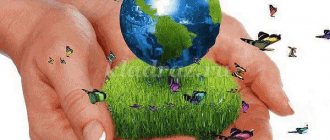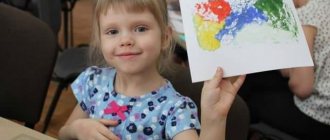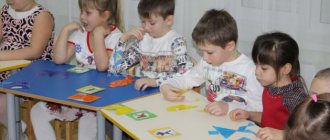Project “The role of folklore in the development of preschool children”
2nd junior group
Project: medium duration, group, role-playing game, creative.
Implementation period: November 2016 – April 2017 academic year.
The relevance of this topic at the present stage is due to the need to study works of children's folklore by teachers, since folk pedagogy arose as a practice, as the art of education, it is older than pedagogical science, has always enriched it and, in turn, has itself been enriched by it. Fairy tales, songs, proverbs, counting rhymes, nursery rhymes, nursery rhymes, drawing lots, and tongue twisters have always been inextricably linked with the experience of folk pedagogy and were widely used in the work of preschool educational institutions.
V. A. Sukhomlinsky emphasized the need and importance of studying moral ideas and the pedagogical views of the people arising from them. He believed that, despite the richness and enormous practical significance of folk pedagogy, it is not properly studied, and in-depth research on these problems is not carried out. “No one has yet seriously thought about folk pedagogy, and apparently this has brought a lot of trouble to pedagogy,” he wrote. — I am sure that folk pedagogy is the focus of the spiritual life of the people. Folk pedagogy reveals the features of the national character, the face of the people! The character of the people, the face of the people, their thoughts and aspirations, moral ideals are especially clearly manifested in the fairy tales, epics, legends, epics, sayings and proverbs created by them.”
Many teachers undeservedly ignore folklore and pay little attention, but folklore is of great importance in the development of speech in preschool children. Whether they are songs, proverbs, nursery rhymes, they are characterized by richness, fullness, brightness of speech, intonation nuances - this cannot but affect the child’s speech. Meanwhile, correctly delivered speech is one of the keys to a person’s success in the modern world. Competent, emotionally rich speech will allow you to quickly and easily find a common language with any people and organically fit into any team. This, in turn, leads to the formation of adequate self-esteem and self-confidence. Therefore, we consider it necessary to start introducing children to folklore works as early as possible.
In this regard, we have set ourselves the task of presenting how oral folk art is used in working with children in our preschool educational institution, to show how children's folklore develops children's spoken language, enriches their vocabulary, and instills a love of folklore in direct activities and in routine moments .
The problem the work is aimed at: Children have a low level of speech development: poor, boring, monotonous speech. Children's speech is slurred, incoherent, and there is no clear pronunciation of sounds in words. Inability to conduct a conversation with adults and peers.
Project goals: Development of speech of children of primary preschool age through small forms of folklore.
Project objectives:
- To acquaint children with various forms of children's folklore, with the traditions and images of the Russian people.
- Develop active speech.
- Develop spirituality, creativity, cognitive interest.
- To cultivate the moral qualities of a preschooler’s personality, a sustainable interest and love for folk art.
Stage 1 – “Analytical”
- Carrying out diagnostic activities.
- Identification of the psychological and pedagogical needs of parents.
Stage 2 – “Preparatory”
- Creating conditions for the implementation of the project, studying relevant literature.
- Development of a plan - a program of cooperation between preschool educational institutions, family and society (conclusion of cooperation agreements).
- Planning work on organizing work with children to implement the project’s objectives.
Stage 3 – “Basic”
- Implementation of developed plans for teaching activities with children.
- Organization of joint activities of kindergarten teachers, family and society.
Stage 4 - “Final”
- Generalization and presentation of work experience and analysis of achieved results.
Expected results
Interest in oral folk art and fiction.
Enriching children's vocabulary with new words, phrases, and expressions.
Development of communication skills with adults and peers.
A positive attitude towards regime moments will be formed.
Parents will develop an understanding of the need to use small forms of folklore in the development of children’s speech.
Necessary conditions for project implementation
- Teachers' knowledge of special artistic means: the ability to sing, dance, play folk musical instruments.
- Interaction with families of pupils and society to create a subject-developing environment and conditions for introducing folklore into the life of preschool educational institutions.
- Active co-creation of adults and children, their common experience, a sense of involvement with the actions of heroes of folklore, the ability to engage in playful interaction with children, encouraging their creativity and imagination.
At the preparatory stage of work, we did the following: • selected folklore material that was appropriate for the age of the children; • a card index of different types of children's folklore has been compiled for all regime moments; • illustrated literature with folklore works was selected.
At the second stage of the project, a long-term plan was drawn up based on the educational program being implemented, taking into account the age characteristics and level of development of each child. To achieve the goals we set, we included gaming, artistic and literary activities, the formation of cultural and hygienic skills in long-term planning, and systematized the work.
It was very important to create a developmental environment. We selected appropriate printed board games, books, and visual materials that would help children consolidate basic speech skills and knowledge of folk genre works, and develop the ability to independently use this knowledge. We designed the “Russian Izba” model, in which we placed objects of ancient utensils, examples of decorative and applied art, helping children to become more familiar with the history and life of the Russian people and compare them with the objects that people use today in everyday life. To use small forms of folklore not only at speech development events, but also in musical and productive activities, centers for music, theatrical performance and art were created in groups.
We considered events using Russian folklore not as a traditional form of education, but as vibrant communication with children. The work was based on the active participation and co-creation of the teacher and the child. A colorful action plays out before the eyes of the children: animals speak in human voices, sing, dance, play, etc. Introducing a mood of intricacy, playful fun, and sometimes some pampering - this is the advantage of folklore events. Another technique we use is a dynamic emphasis on fragments of text combined with movements. This technique is especially effective when working with young children. Children's speech is accompanied by hand movements. It has been proven that there is a close connection between speech function and the general motor system. The combination of body movement, fine motor skills of the hands and speech organs helps relieve tension, teaches the observance of speech pauses, helps get rid of the monotony of speech, normalizes its pace and forms correct pronunciation. Memorizing poetic texts and nursery rhymes with the participation of hands and fingers leads to the fact that the child remembers better, develops imagination and activates mental activity.
Regular use of folklore in kindergarten allows you to lay the foundation for the psychophysical well-being of the child, which determines the success of his overall development in the preschool period of childhood.
Project Implementation Plan
| Stages | Event name | Deadlines | Venue of the event |
| Preparatory | With children Organizing and conducting diagnostic procedures. Observation. With parents Questioning of parents “Oral folk art”. With teachers Studying the experience of teachers-practitioners in the development of speech with the help of folklore in preschool children. | November December | MBDOU "Kindergarten No. 61" |
| Basic | With kids 1. Reading songs, nursery rhymes, chants. 2. Reading fairy tales. 3. Watching animated films: “The Horned Goat is Coming,” “Magpie – Crow,” “Two Cheerful Geese” 5. Dramatization of fairy tales. 6. Tabletop theater. 7. Russian folk outdoor games. 8. Russian folk games - round dances. 9. Games - dramatization. 10. Illustration of fairy tales and nursery rhymes. 11. Finger games. With parents 1. Consultation “The role of folklore in the development of children’s speech.” 2. Memo “Folklore in the everyday life of children.” 4. Consultation “Raising children using folklore”. With teachers 1. Development of methodological recommendations for educators on the development of children’s speech through oral folk art. 2. Consultation “Introducing preschool children to national culture and traditions.” | January February | MBDOU "Kindergarten No. 61" |
| Final | With kids Entertainment “Visiting Grandma” With parents 1. Decorating a corner for parents “Folklore in our family.” 2. Design of the album “Proverbs and sayings of the Russian people.” 3. Presentation of the project at the parent meeting. 4. Speech dedicated to “Easter” with chants. Russian folk games. With teachers 1. Summarizing the results of the project and presenting them to colleagues. 2. Presentation of the project at the teachers' meeting. | March, April | MBDOU "Kindergarten No. 61" |
Bibliography:
1. Anikin V.P. Russian folklore. M., 1986.
2. Borodich A. M. “Methods of speech development in children” M., Prosveshchenie, 1981. 3. Vetrova V. “Okay, okay.” 1995 "Knowledge".
4. Galanova T.V. “Educational games with kids up to those years” - Ya.; "Academy of Development", 2002
5. Eliseeva L.N. “Anthology for little ones” - Moscow; ed. "Enlightenment", 1987
6. Kiseleva L. S. et al. Project method in the activities of a preschool institution: - M.: ARKTI, 2003. - 96 p.
7. Kozyreva L. M. I speak beautifully and correctly. Speech development in children from birth to 5 years. M., 2005.
8. Novitskaya M. “Folklore school” // Preschool education, 1993. No. 9.





